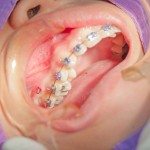
Anchorage is required during orthodontic treatment to prevent unwanted tooth movement. Traditionally this can be provided from site in the mouth (intraoral anchorage) or from outside the mouth (extraoral). While surgical techniques such as metal screws have been suggested since the 1940s recently modified dental implants have been used. The main aim of this review was to assess the effects of surgical anchorage techniques compared to conventional anchorage in the prevention of unwanted tooth movement in patients undergoing orthodontic treatment.
Methods
Searches were conducted in Cochrane Oral Health Group’s Trials Register, the Cochrane Central Register of Controlled Trials (CENTRAL) Medline, Embase, ClinicalTrials.gov, the World Health Organization (WHO) International Clinical Trials Registry Platform and key international orthodontic and dental journals with no language restriction. Parallel group, randomised, controlled trials in which surgically assisted anchorage reinforcement techniques were used during orthodontic treatment were considered. The primary outcome measure was the mesiodistal movement of upper first molars (in mm). At least two review authors independently and in duplicate extracted data and carried out risk of bias assessments. Standard Cochrane analytical methods were used.
Results
- 15 studies involving a 561 patients were included.
- 8 were assessed at high risk of bias, 6 at unclear risk and 1 at low risk.
- 10 studies (407 randomised and 390 analysed patients) compared surgical anchorage with conventional anchorage for the primary outcome
- A random-effects meta-analysis of 7 studies for the primary outcome found strong evidence of an effect of surgical anchorage.
- Compared with conventional anchorage, surgical anchorage was more effective in the reinforcement of anchorage by 1.68 mm (95% CI -2.27 mm to -1.09 mm) moderate quality evidence. This result should be interpreted with some caution, however, as there was a substantial degree of heterogeneity for this comparison.
- There was no evidence of a difference in overall duration of treatment between surgical and conventional anchorage (low quality of evidence)
- Information on patient-reported outcomes such as pain and acceptability was limited and inconclusive.
- When direct comparisons were made between two types of surgical anchorage, there was a lack of evidence to suggest that any one technique was better than another.
Conclusions
The authors concluded
There is moderate quality evidence that reinforcement of anchorage is more effective with surgical anchorage than conventional anchorage, and that results from mini-screw implants are particularly promising. While surgical anchorage is not associated with the inherent risks and compliance issues related to extraoral headgear, none of the included studies reported on harms of surgical or conventional anchorage.
Commentary
This review is a substantive update of a Cochrane review published in 2007. When that review was initially published one a single study was included so this review adds a further 14 studies. Other less rigorous reviews have been published and are in agreement with the findings of this review. The authors recommend that further research should look at methods to reduce selections bias and pay attention to determine appropriate start and endpoints to measure molar movement. They also suggest a greater focus on relevant outcomes rather that routine cephalometric analysis.

There is limited quality evidence to suggest a difference in treatment duration between surgical and conventional anchorage.
Links
Jambi S, Walsh T, Sandler J, Benson PE, Skeggs RM, O’Brien KD. Reinforcement of anchorage during orthodontic brace treatment with implants or other surgical methods. Cochrane Database of Systematic Reviews 2014, Issue 8. Art. No.: CD005098. DOI: 10.1002/14651858.CD005098.pub3.
Cochrane Oral Health Group – Anchoring braces with dental implants or other surgical methods
Dental Elf- 13th Nov 2012 – Review suggests a modest failure rate for orthodontic mini-screws used for anchorage reinforcement Dental Elf- 14th Nov 2012 – No robust evidence to indicate maximum insertion torque levels for orthodontic mini-implants

Systematic Review finds no evidence of difference in treatment duration between surgical and conventional anchorage. http://t.co/aLzjPF4bRT
Such useful summaries Derek. Many thanks for all your hard work.
Hi @CochraneOHG , we blogged about your SR on reinforcing anchorage during orthodontic brace treatment. Any thoughts? http://t.co/aLzjPF4bRT
SR is inconclusive due to limited information on patient reported outcomes regarding orthodontic anchorage treatment. http://t.co/aLzjPF4bRT
Don’t miss: SR suggests that surgical is more effective than conventional anchorage for orthodontic treatment. http://t.co/WG3YnyPr2s
[…] Review suggests that surgical anchorage is more effective than conventional anchorage for orthodonti… […]